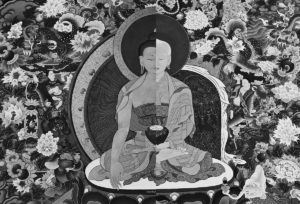
Aims and Objectives
To provide training, support and connections for Tibetan Buddhist nuns from beyond traditional Himalayan regions.
To ensure these nuns have all the causes and conditions in place to devote themselves wholeheartedly to their study and practice.
To raise awareness amongst existing Buddhist communities worldwide to appreciate the importance of their local ordained sangha.
By raising this awareness, local communities recognise the value of caring for their local sangha as central to their overall development.
To ensure that wherever the Dharma has taken root in the world, it is served by a well established four-fold Sangha of monks, nuns, lay women and lay men.


The Alliance of Non-Himalayan Nuns (ANHN) is a international, non-sectarian organization committed to supporting women ordained as Tibetan Buddhist nuns from beyond traditional Tibetan Buddhist regions. ANHN is open to all and seeks to advance all existing organisations and communities committed to supporting these nuns.
Our aim is to raise awareness and give support to these nuns, in accord with the support given to their Himalayan Dharma sisters, so they may swiftly become exemplary models of the monastic life well lived and thus bring greatest benefit to their local communities across the world.
These modern day nuns need an advocate to speak on their behalf, to help International Buddhist communities develop frameworks to fully support monastics, starting first with their local monastics, as central to their overall growth.
When the Buddha began to teach, the deep intuitive response in those who connected with his Dharma, was to give up the household and step forth into monastic life. The Buddha advocated the importance of this choice, not as the only option for those seeking liberation but as part of the four-fold sangha: fully ordained monks, nuns, male and female lay followers. This stable basis, the Buddha emphasised, would enable the teachings to remain a living tradition wherever it becomes established in the world.
The relationship between lay sangha and monastics is one of mutual benefit. In reliance upon material support and encouragement from the lay sangha, monastics can progress, dedicating themselves to full-time study and practice so they may quickly become well trained and capable of spiritually guiding their lay community.
As Buddhism expands and takes root in new countries the arising of the four-fold sangha is in keeping with the Buddha’s intent. Where this presence is strong, the teachings can flourish.
Non Himalayan Nuns
The first woman to be ordained by the Buddha was Mahprajapati Gautami. When she requested ordination, the Buddha hesitated. It is recorded that he was concerned that nuns would be too vulnerable, as there was no existing nuns community for them to join. They were not coming from a society that had traditionally followed Buddhist teachings.
Ananda, the Buddha’s closest disciple, advocated on behalf of Mahaprajapati reminding the Buddha that since women were equally capable of attaining enlightenment, then naturally, ordination should equally be open to them.

Our modern day non-Himalayan nuns find themselves in a similar predicament. They too are pioneers, ordaining from outside of a traditional structure and so too are vulnerable in the absence of established communities for them to step into.
Naturally, since Tibetans as refugees needed to reestablish their monastic institutions in their newly adopted countries, the emphasis of fundraising and financial support has been focused on this plight. Now, with this work completed for the most part, fundraising and support can be directed to include monastics across the world, wherever they are found, in their local Dharma communities.
To date, the majority of non Himalayan nuns must find their own financial means – thus many cannot consider ordination at all, others ordain and continue paid work in a lay setting, or within Dharma centres; or delay their ordination for many years so they can save sufficient personal funds to then take the step of leaving the householder’s life.
Such a situation holds back the overall development of the Dharma. These women bring a great wealth of life experience, sincere renunciation and great insight into the challenges of modern life that enable them to teach the Dharma with great skill and understanding. They are a precious resource for their respective local communities and as such are in great need of genuine nurturing.
Our Alliance offers a collective voice, across lineages, to help raise awareness, create lines of communication and support between nuns across the world.
By providing financial and emotional support we enable them to focus their lives on their study and practice. Through this dedication, they can sincerely contribute to ensuring that the four-fold sangha can indeed be strong and the Buddhist teachings to continue benefiting the world.

“I became ordained after many years in the Dharma. My heart was yearning to take robes. It seemed so clear to me that I needed to do this. I had deep respect for the monastics who were teaching me. I wanted to follow their example and give my whole life to Dharma practice. Years later, I am simply tired of being alone.
I am invisible to traditional monastic communities and to my local lay community.
The loneliness has worn me down. I quite honestly dont know what to do next. “
“I was raised in the West, in a Buddhist family and since the age of 10, I have wanted to be a nun. But I have not taken the step.
I saw it for myself in Asia how Western nuns who , like Asian nuns, do not have much money are treated more like lay-practitioners than like nuns. How they have to pay for studies like everyone else and how they struggle to receive financial support, even from Western lay-practitioners who often already support an Asian monastery.
It is clear to me that becoming a nun is a tool to go deeper into the practice, renouncing worldly affairs – but for that one needs a proper support, environment and training. If this is not given one might end up with a shaved head and robes but a lot of worries and frustration.
These are all things I am thinking about now before becoming a nun.
On the one hand it is really good to think it through beforehand but on the other hand it saddens me that people who deeply want to renounce and only focus on the path of enlightenment for all sentient beings are so little supported and have to face so many difficulties.”

